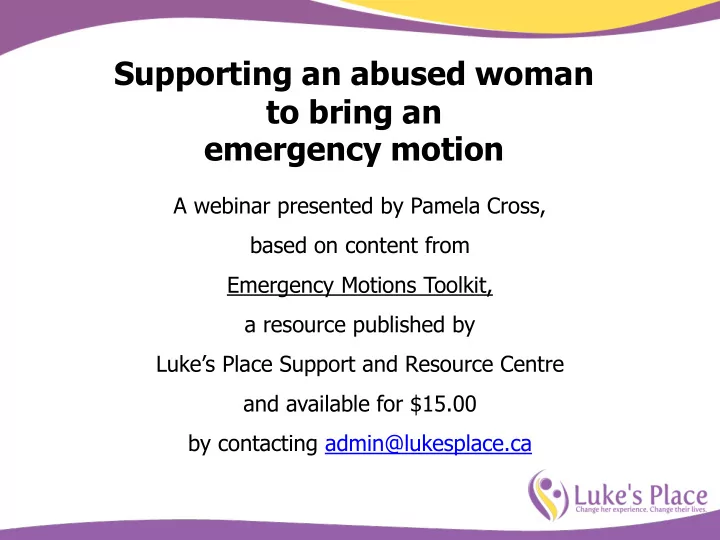

Supporting an abused woman to bring an emergency motion A webinar presented by Pamela Cross, based on content from Emergency Motions Toolkit, a resource published by Luke’s Place Support and Resource Centre and available for $15.00 by contacting admin@lukesplace.ca
Objectives This webinar will assist you in supporting women who are thinking about bringing an emergency motion in family court. You will learn : What an emergency motion is What the process is to apply for one Common reasons that emergency motions fail The importance of evidence How to support women in gathering evidence and presenting effectively
Disclaimer This webinar provides basic legal information and not legal advice. It is not a replacement or substitute for legal advice or representation. Any woman considering taking any action in family court should meet with a lawyer if at all possible.
Some resources for women who cannot afford to pay for a lawyer include: Family Law Information Centre (at family court) Family Court Duty Counsel (at family court) Family Law Service Centre Family Court Support Worker 2-hour Family Violence Authorization certificate available from many women’s shelters
What an emergency motion is A way to step outside the regular Application and Motion processes Allows a party to obtain a short-term order very quickly
What an emergency motion is (cont’d) Only available when there is a serious emergency They are the exception to the rule and are hard to obtain
Types of emergency motion There are two types of emergency motion: • Motion without notice, also called an ex parte motion • Urgent motion
When to bring an emergency motion Safety Children Property Financial support
Procedure Usually brought at the beginning of a case, but can be brought at any time an emergency arises Woman prepares required documents (Forms 14, 14A and likely 35.1) and submits at court counter
Procedure (cont’d) No court appearance – judge reads documents in chambers and makes a decision Order must be immediately served on the abuser before it is in effect
Why emergency motions fail Person is seen by the court to already be safe Crisis has passed, at least for the time being There is an alternative The circumstances don’t meet the emergency standard
How to meet the test of emergency Situations that could meet the test: • Abduction or threat of abduction • Imminent return or release of abuser who has made threats of harm • Abuser has threatened to deplete all family’s assets and has means to do so
How to meet the test of emergency (cont’d) Woman needs to provide strong evidence to support her claim Very important not to exaggerate or overstate the facts as this can jeopardize the future of the woman’s case
The importance of evidence Standard of proof: on a balance of probabilities Court needs to be strongly persuaded because no evidence is being heard from the abuser Court looking for red flags that this is an emergency
What makes good evidence a history of violence, especially if frequency and severity are increasing a history of breaching restraining orders or other court orders threats of violence, homicide, suicide or abduction of child(ren)
What makes good evidence (cont’d) stalking behaviour Unemployment alcohol or drug dependency depression /history of mental illness
What makes good evidence (cont’d) history of withholding children abuser’s ties to another jurisdiction any activities by the abuser that are consistent with leaving abuser has children’s passports
Presenting evidence effectively a strong, detailed affidavit is important should begin with most recent event, then present history in chronological order should identify tactics woman has already attempted to deal with problem
Supporting a woman who is considering an emergency motion become familiar with judicial attitudes in your family court help women identify degree of crisis support her in gathering evidence
Supporting a woman who is considering an emergency motion (cont’d) assist her in preparing affidavit safety planning support her in preparing for the return to court
Additional resources Emergency Motions Toolkit Luke’s Place Support and Resource Centre $15.00 admin@lukesplace.ca
Questions?
Recommend
More recommend